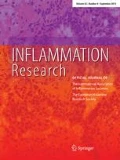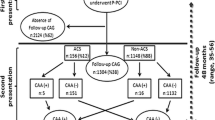Abstract.
Objective and design: It is believed that the magnitude of the systemic inflammatory response induced by percutaneous coronary intervention (PCI) impacts on the long-term outcomes in patients with stable angina (SA) and unstable angina (UA). We aimed to determine whether an inflammatory response appears in in-stent restenosis (ISR) patients undergoing balloon angioplasty and to assess its pattern and magnitude in relation to SA and UA subjects.
Subjects: 80 patients (59 with SA, 10 with UA, 11 with ISR) were enrolled into the prospective study.
Treatment: SA and UA patients undergoing single vessel coronary balloon angioplasty followed by stenting versus ISR subjects in whom only balloon angioplasty was performed.
Methods: C-reactive protein (CRP), serum amyloid A (SAA), tumor necrosis factor α (TNF-α) and interleukin 10 (IL-10) were measured in blood samples collected before and 6, 24 h and 1 month after the procedure.
Results: A comparable pattern of inflammatory response in terms of CRP and SAA concentrations in subjects undergoing PCI due to ISR and SA was discovered while in unstable patients its magnitude was substantially higher. CRP and SAA levels increased significantly in each group with the peak value at 24 h and the baseline levels remarkably correlated with the highest markers’ concentrations. In contrast, preprocedural TNF-α concentrations were higher in ISR group when compared with SA and UA patients. Additionally, in ISR group a twofold increase in their values of borderline significance at 6 h was noted. SA and UA subjects were found to have significantly lower TNF-α levels at 6 and 24 h after the intervention though the marker concentrations markedly increased with peak values at 1 month. The levels of IL-10 did not differ at any time point between the groups.
Conclusions: We suggest that PCI triggers a systemic inflammatory response in patients with ISR and considerable differences in its pattern when compared with SA and UA patients were demonstrated. Moreover, a high preprocedural TNF-α level and its increase provoked by PCI in the ISR group warrant the need for further investigation of its possible involvement in the restenosis process.
Similar content being viewed by others
Author information
Authors and Affiliations
Corresponding author
Additional information
Received 17 September 2004; returned for revison 22 November 2004; accepted by A. Falus 4 January 2005
Rights and permissions
About this article
Cite this article
Kozinski, M., Krzewina-Kowalska, A., Kubica, J. et al. Percutaneous coronary intervention triggers a systemic inflammatory response in patients treated for in-stent restenosis – comparison with stable and unstable angina. Inflamm. res. 54, 187–193 (2005). https://doi.org/10.1007/s00011-005-1342-0
Issue Date:
DOI: https://doi.org/10.1007/s00011-005-1342-0




